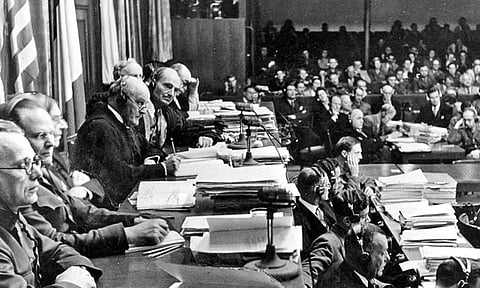

By James A Goldston
NEW YORK: If there’s one thing that unites virtually everyone with respect to the wars in Ukraine and the Middle East, it is that other people’s views are distorted by “double standards.” The belief that one party is being held to a different measure than others underlies many of the disagreements that have resonated from each conflict to contort global politics. Just last week, for example, the provisional order of the International Court of Justice (ICJ) on South Africa’s claims that Israel is guilty of genocide was widely interpreted through the lens of double standards. Such accusations plague not just Israel and Hamas, or Russia and Ukraine, but also the United States and its Western allies, the International Criminal Court (ICC), and even institutions of higher learning.
But while the accusation of double standards cuts across many spheres of public life – from sexual and racial equality to sports and bathrooms – it has particular resonance in international criminal justice. The authority of all justice systems, which depend on the public’s perception of their fairness and impartiality, is vulnerable to charges of moral hypocrisy. This is especially true of international courts, such as the ICC (which recently celebrated its 25th anniversary) or those established in the 1990s and 2000s to address crimes in the former Yugoslavia, Rwanda, and Cambodia. Though some international norms and institutions have been around for decades, they are still relatively under-used, in part because most national politicians would prefer not to have someone looking over their shoulders.
International crimes lie at the intersection of law and politics, where the consequences for each case before a court can be existential for the parties involved. Prosecuting a head of state or a senior minister for grave crimes offers a rare opportunity to demonstrate the law’s ability to constrain the arbitrary exercise of power. But precisely because the stakes are so high, such prosecutions can blur the distinction between law and politics in ways that will lead some observers to doubt whether the rule of law is even possible.
The Nuremberg and Tokyo tribunals that prosecuted German and Japanese leaders after World War II set the template for the international justice movement. Among that movement’s bedrock principles are that justice is an essential foundation for enduring peace; that no one is above the law; and that individual criminal responsibility enables societies to confront what was done in their name without imposing collective punishment.
The post-WWII tribunals developed pathbreaking legal innovations, including the new crimes of aggression, crimes against humanity, and genocide to accompany more well-settled laws and customs of war. The tribunals confirmed that individual political and military leaders can and should be held accountable for what had long been considered acts of state, and they rejected the “just-following-orders” defense (though they allowed it to be considered in sentencing). As the immediate postwar era gave way to the Cold War, these courts became, as historian Francine Hirsch of the University of Wisconsin-Madison observed of Nuremberg, “laboratories for the articulation and development of a language about human rights.”
It does not diminish the achievements of the Nuremberg and Tokyo tribunals to note that the trials they conducted – like those that have followed – were imperfect vehicles in the search for abstract truth. In Soviet Judgment at Nuremberg, Hirsch calls attention to the essential but previously overlooked role of the Soviet Union and its jurists in bringing the Nuremberg trials to fruition. In Judgment at Tokyo, Princeton University historian Gary J. Bass highlights the extent to which uneven judicial leadership combined with fractious international politics to weaken the Tokyo tribunal’s symbolic resonance.
In other words, both seminal tribunals were born in, and riven by, emerging Cold War politics; they were plagued by real and perceived double standards and hypocrisy; and their legacies are as complicated as their origins. On one hand, they embody the immortal promise declared by Nuremberg’s American lead prosecutor, Robert H. Jackson: that “great nations, flushed with victory and stung with injury [may] stay the hand of vengeance and voluntarily submit their captive enemies to the judgment of the law.” On the other hand, the Nuremberg and Tokyo trials have since served as fodder for cynical politicians to pervert their meaning and exploit their shortcomings.
Nuremberg came first, was shorter (lasting just over ten months), and has always received far more attention in the West. By contrast, the Tokyo tribunal’s majority judgment belatedly relied on Nuremberg’s reasoning to uphold its own jurisdiction, took far longer (two and a half years), and was marred by visible disagreements among the 11 judges.
Most of these disputes concerned core issues related to the Tokyo court’s legitimacy, as reflected in three dissents and two concurring opinions, as well as the slim majorities in favor of the death sentences imposed on seven accused (16 others received life imprisonment and two lesser sentences). While the main Nuremberg trial acquitted three of 21 defendants (and three of six alleged criminal organisations), none of the 25 defendants on trial at Tokyo was acquitted of all charges.
The foundational principles and institutions of international criminal law did not emerge out of thin air. They were often the product of concrete political interests and contestation. That fact alone is not damning (political will is always necessary to turn rhetoric into reality), but legitimacy is harder to secure if the lofty rhetoric surrounding international justice fails to take stock of the politics in which it is embedded.
As Hirsch shows, proposals for an international criminal court to prosecute crimes of aggression (“persons violating peace” and “acts infringing on peace”) emerged in the 1930s in the Soviet Union, where they were “prompted by the looming threat of [Nazi] Germany and Japan, who had just signed the Anti-Comintern Pact that was clearly directed against the Soviet Union.” Aron Trainin, a Russian scholar and editor who advised the Soviet prosecution at Nuremberg, was a principal source of these ideas.